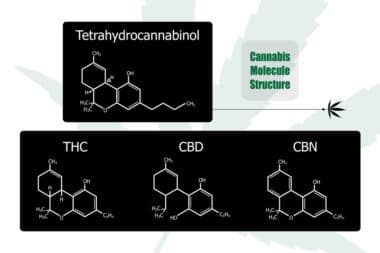Cannabidiol is a popular natural remedy used for many common ailments. Better known as CBD, it is one of the 104 chemical compounds known as cannabinoids found in the cannabis or marijuana plant, Cannabis sativa. Many wonders, “What does CBD oil do?”
Tetrahydrocannabinol (THC) is the main psychoactive cannabinoid found in cannabis, and causes the sensation of getting “high” that’s often associated with marijuana. However, unlike THC, CBD is not psychoactive.
This quality makes CBD an appealing option for those who are looking for relief from pain and other symptoms without the mind-altering effects of marijuana or certain pharmaceutical drugs. CBD oil is made by extracting CBD from the cannabis plant, then diluting it with a carrier oil like coconut or hemp seed oil.
It’s gaining momentum in the health and wellness world, with some scientific studies confirming it may help treat a variety of ailments like chronic pain and anxiety.
What Does CBD Oil Do? The 6 CBD Health Benefits
Here are six health benefits of CBD oil that are backed by scientific evidence.
Relieves Pain
Marijuana has been used to treat pain as far back as 2900 B.C.
More recently, scientists have discovered that certain components of marijuana, including CBD, are responsible for its pain-relieving effects.
The human body contains a specialized system called the endocannabinoid system (ECS), which is involved in regulating a variety of functions including sleep, appetite, pain and immune system response.
The body produces endocannabinoids, which are neurotransmitters that bind to cannabinoid receptors in your nervous system.
Studies have shown that CBD may help reduce chronic pain by impacting endocannabinoid receptor activity, reducing inflammation and interacting with neurotransmitters
For example, one study in rats found that CBD injections reduced pain response to surgical incision, while another rat study found that oral CBD treatment significantly reduced sciatic nerve pain and inflammation.
Several human studies have found that a combination of CBD and THC is effective in treating pain related to multiple sclerosis andarthritis.
An oral spray called Sativex, which is a combination of THC and CBD, is approved in several countries to treat pain related to multiple sclerosis.
In a study of 47 people with multiple sclerosis, those treated with Sativex for one month experienced a significant improvement in pain, walking and muscle spasms, compared to the placebo group.
Another study found that Sativex significantly improved pain during movement, pain at rest and sleep quality in 58 people with rheumatoid arthritis.
Could Reduce Anxiety and Depression
Anxiety and depression are common mental health disorders that can have devastating impacts on health and well-being.
According to the World Health Organization, depression is the single largest contributor to disability worldwide, while anxiety disorders are ranked sixth.
CBD oil has shown promise as a treatment for both depression and anxiety, leading many who live with these disorders to become interested in this natural approach.
In one study, 24 people with social anxiety disorder received either 600 mg of CBD or a placebo before a public speaking test.
The group that received the CBD had significantly less anxiety, cognitive impairment and discomfort in their speech performance, compared to the placebo group
CBD oil has even been used to safely treat insomnia and anxiety in children with post-traumatic stress disorder.
CBD has also shown antidepressant-like effects in several animal studies.
These qualities are linked to CBD’s ability to act on the brain’s receptors for serotonin, a neurotransmitter that regulates mood and social behavior.
Can Alleviate Cancer-Related Symptoms
CBD may help reduce symptoms related to cancer and side effects related tocancertreatment, like nausea, vomiting and pain.
One study looked at the effects of CBD and THC in 177 people with cancer-related pain who did not experience relief from pain medication.
Those treated with an extract containing both compounds experienced a significant reduction in pain compared to those who received only THC extract.
CBD may also help reduce chemotherapy-induced nausea and vomiting, which are among the most common chemotherapy-related side effects for those with cancer.
Though there are drugs that help with these distressing symptoms, they are sometimes ineffective, leading some people to seek alternatives.
May Reduce Acne
Acne is a common skin condition that affects more than 9% of the population.
It is thought to be caused by a number of factors, including genetics, bacteria, underlying inflammation and the overproduction of sebum, an oily secretion made by sebaceous glands in the skin.
Based on recent scientific studies, CBD oil may help treat acne due to its anti-inflammatory properties and ability to reduce sebum production.
One test-tube study found that CBD oil prevented sebaceous gland cells from secreting excessive sebum, exerted anti-inflammatory actions and prevented the activation of “pro-acne” agents like inflammatory cytokines.
Another study had similar findings, concluding that CBD may be an efficient and safe way totreat acne, thanks in part to its remarkable anti-inflammatory qualities.
Though these results are promising, human studies exploring the effects of CBD on acne are needed.
Might Have Neuroprotective Properties
Researchers believe that CBD’s ability to act on the endocannabinoid system and other brain signaling systems may provide benefits for those with neurological disorders.
In fact, one of the most studied uses for CBD is in treating neurological disorders like epilepsy and multiple sclerosis. Though research in this area is still relatively new, several studies have shown promising results.
Sativex, an oral spray consisting of CBD and THC, has been proven to be a safe and effective way to reduce muscle spasticity in people with multiple sclerosis.
One study found that Sativex reduced spasms in 75% of 276 people with multiple sclerosis who were experiencing muscle spasticity that was resistant to medications.
Another study gave 214 people with severe epilepsy 0.9—2.3 grams of CBD oil per pound (2—5 g/kg) of body weight. Their seizures reduced by a median of 36.5%.
One more study found that CBD oil significantly reduced seizure activity in children with Dravet syndrome, a complex childhood epilepsy disorder, compared to a placebo.
However, it’s important to note that some people in both these studies experienced adverse reactions associated with CBD treatment, such as convulsions, fever and diarrhea.
CBD has also been researched for its potential effectiveness in treating several other neurological diseases.
For example, several studies have shown that treatment with CBD improved quality of life and sleep quality for people with Parkinson’s disease.
Additionally, animal and test-tube studies have shown that CBD may decrease inflammation and help prevent the neurodegeneration associated with Alzheimer’s disease.
In one long-term study, researchers gave CBD to mice genetically predisposed to Alzheimer’s disease, finding that it helped prevent cognitive decline.
Several Other Potential Benefits
CBD has been studied for its role in treating a number of health issues other than those outlined above.
Though more studies are needed, CBD is thought to provide the following health benefits:
- Antipsychotic effects:Studies suggest that CBD may help people with schizophrenia and other mental disorders by reducing psychotic symptoms.
- Substance abuse treatment:CBD has been shown to modify circuits in the brain related to drug addiction. In rats, CBD has been shown to reduce morphine dependence and heroin-seeking behavior.
- Anti-tumor effects:In test-tube and animal studies, CBD has demonstrated anti-tumor effects. In animals, it has been shown to prevent the spread of breast, prostate, brain, colon and lung cancer.
- Diabetes prevention:In diabetic mice, treatment with CBD reduced the incidence of diabetes by 56% and significantly reduced inflammation
Conclusion
CBD oil has been studied for its potential role in treating many common health issues, including anxiety, depression, acne and heart disease.
For those with cancer, it may even provide a natural alternative for pain and symptom relief.
Research on the potential health benefits of CBD oil is ongoing, so new therapeutic uses for this natural remedy are sure to be discovered.
Though there is much to be learned about the efficacy and safety of CBD, results from recent studies suggest that CBD may provide a safe, powerful natural treatment for many health issues.









Reply